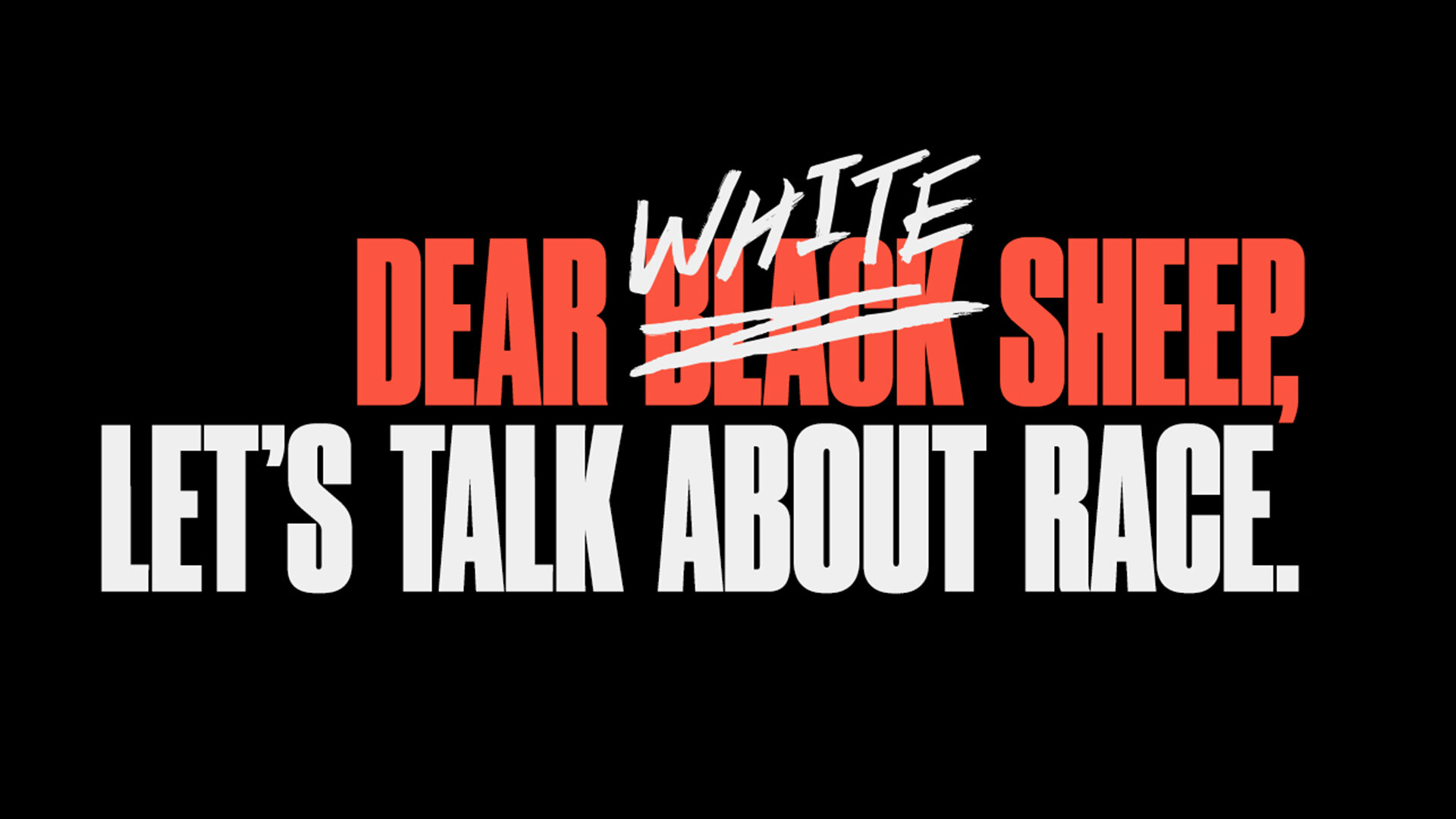
TALKING ISN’T ENOUGH ANYMORE
DEAR BLACK SHEEP
03/06/2020
The advertising industry is very good at talking. But now is a time for action. At BBH we recognize that the advertising industry has a long way to go when it comes to fighting racism. Last February, Dear Black Sheep, our internal platform for underrepresented voices, invited Nikesh Shukla and Rohkhaya Diallo into our office to candidly discuss race.
The talk inspired us all to take action and to commit to improving diversity and inclusion at BBH. The events that took place in Minnesota last week have shaken us all and we now recognise how urgent and critical our commitment to racial equality is. We know we have a lot to do but for now we thought it was important to share this.
– Karen Martin, Managing Director at BBH London
Talking isn’t enough anymore – by Dear Black Sheep
We are living through a moment. And it may feel confusing. But it is simple: no individual should be disadvantaged because of their skin colour. Simply agreeing with that position now is not enough. Here we lay out three ways to be active about that belief in your lives and in the world of marketing. But first, let’s back up and establish a timeline.
In February, Campaign magazine dedicated an issue to the ‘POC’ voices that are fighting racial inequality and whitewashing in the advertising industry. The issue included data from the latest IPA survey on diversity and highlighted troubling stats like these:
Only 12% of women of colour working in advertising work in senior roles – black women only hit 6%
White men are three times as likely to be in a senior position as women of colour
More ethnically diverse businesses outperform those that aren’t by 33%
By working with the brilliant collective POCC on this issue the publication made it clear that they were ready to prioritise the voices of minorities in the creative industries.
In February, Dear Black Sheep held a talk at the BBH office titled ‘Dear White Sheep, Let’s Talk About Race’. We invited award winning writer and editor Nikesh Shukla and award winning journalist and filmmaker Rokhaya Diallo to discuss how race has impacted their work. The talk tackled implicit bias, diversity without inclusion and how much work our industry and the UK in general needed to do to evolve beyond the racialized social barriers that impact people who are not white on a daily basis.
In May, a video of Amy Cooper threatening to call the police on Christian Cooper, a birdwatcher who had asked her to put her dog on its leash, went viral. Christian is a black man and in the video Amy is heard saying ‘there is an African American man threatening my life, please come now’. Nobody was threatening her life, he had simply calmly asked her to obey the law and put her dog on a leash. Amy has now joined a long list of white women who have been filmed calling the police on black people for no reason at all (a la BBQ Betty, Permit Patty and Cornerstone Caroline).
In May, George Floyd was murdered by Derek Chauvin, a police officer. The act was filmed and yet another video of black death was widely circulated across the internet. This is not the first, second or third time this has happened.
In May, #BlackLivesMatter protests in Minnesota became violent and the President of the United States of America responded by saying, ‘‘when the looting starts, the shooting starts’. He was quoting Miami Police Chief Walter Headley, who had used the expression when he was fighting against the civil rights movement in 1967.
In May, some of the biggest brands and media companies took a stand. Nike, Netflix, Ben and Jerry’s and several others have used their platforms and their capital to support the #BlackLivesMatter movement. Several major labels have announced that they will be taking part in a ‘blackout day’ to raise money and fight racial injustice.
But most brands are still silent, and the response from Adland in general has been tepid at best.
I’ve written this timeline out because it makes it clear that while there have been some really encouraging and progressive conversations about race in our industry this year, we are not doing enough. The panel discussion we held in February was warmly received by our colleagues at BBH and we’ve seen our agency and other agencies take diversity and inclusion more seriously recently. Seeing Campaign magazine collaborate with POCC was also proof that our industry is ready to highlight, listen to and champion diverse voices. All of that is brilliant but, now it’s time to hold each other accountable. Panel discussions and articles are a good start but, at the end of the day, they are cosmetic acts of racial solidarity. This won’t cut it anymore.
If we keep doing what we’ve been doing this timeline will repeat itself in some form next year and the year after and so on. This is why we need to hold each other accountable and take direct action. If you don’t use your voice now, you’re complicit. Complicit in the dehumanization of individuals because of their skin colour and complicit in the institutionalised racism that has led to the loss of so many lives. A few brands have spoken up, and that’s a great start – but there is an expectation for Adland to do so much more. Most importantly, Adland has the resources to do so much more. We have the power to shape hearts and minds, we understand how to influence human behaviour and we’ve got capital.
If you’ve engaged with the progressive changes in our industry over the last few years and claim to be an ally of your non-white colleagues then now is the time to act. Our industry, our agencies and each of us as individuals need to look closely at what connects Amy Cooper and George Floyd. We need to think about how prejudice, implicit bias and casual racism can lead to death and we need to fight for a planet where we are all treated as equals. We each have a professional responsibility to use our skill set for the greater good and a personal responsibility to respect and protect the human rights of the people around us – no matter what colour their skin is.
There are three simple things you can do today to get started:
Educate yourself: Awareness sits at the root of all change. So if you agree that no individual should be disadvantaged because of their skin colour, there is a burden of responsibility to become aware. These are some great places to get that….
Contemporary – UK
The Good Immigrant, Nikesh Shukla
White Fragility, Robin DiAngelo
Why I’m No Longer Talking to White People About Race, Reni Eddo-Lodge
Brit(ish): On Race, Identity and Belonging, Afua Hirsch
Contemporary – US
Me and White Supremacy: Combat Racism, Change the World, and Become a Good Ancestor, Layla F Saad
How To Be An Antiracist, Dr. Ibram X. Kendi
The New York Times, An Antiracist Reading list, Ibram X. Kendi
Antiracism Resources for more reading suggestions.
Black Lives Matter, with more resources here: https://blacklivesmatters.carrd.co/#resources
2. Be loud, be safe: Once you feel like you’ve educated yourself substantially, share that knowledge with your community. Protesting is a great way to amplify the voices that are being ignored, here are a few tips on how do to it safely in a pandemic and some links to UK protests….
Vice, How to Protest Safely During a Pandemic, Katie Way
Pointers on protests safety: https://blacklivesmatters.carrd.co/#protesters
Campaign Zero, The comprehensive platform of research-based policy solutions to end police brutality in America.
3. Donate: This one is simple and effective. It is also the most important step of the three at the moment. Making individual donations is important and impactful but pushing those with capital to put their money where their mouth is can make a big difference.
UK
Stephen Lawrence Charitable Trust
SARI Stand Against Racism and Inequality
US
More places to donate here: https://blacklivesmatters.carrd.co/#donate
